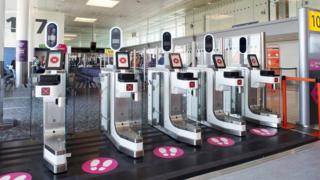 Image copyright
Image copyright
Gatwick Airport
Gatwick first trialled facial recognition-based checks at some of its departure gates last year
Gatwick has become the UK’s first airport to confirm it will use facial recognition cameras on a permanent basis for ID checks before passengers board planes.
It follows a self-boarding trial carried out in partnership with Easyjet last year.
The London airport said the tech should reduce queuing times, but added that travellers would still need to carry their passports.
Privacy campaigners are concerned.
The decision was first reported by the Telegraph newspaper.
On Tuesday, a spokeswoman for Gatwick told the BBC that it had taken the decision after reviewing feedback provided by passengers involved in the earlier test.
“More than 90% of those interviewed said they found the technology extremely easy to use and the trial demonstrated faster boarding of the aircraft for the airline and a significant reduction in queue time for passengers,” she said.
“Gatwick [is now planning] a second trial in the next six months and then rolling out auto-boarding technology on eight departure gates in the North Terminal when it opens a new extension to its Pier 6 departure facility in 2022.”
She added that passengers would still need to pass through the bag-check security zone, at which point they would need to present a boarding pass.
Image copyright
Getty Images
Dulles Airport in the US already uses facial recognition scanners to check passenger IDs
In addition, they would need to scan their passport at the departure gate for the system to be able to match the photo inside to their actual face.
The process is similar to that already used at the ePassport arrival gates at some UK airports. But it differs from Gatwick’s original test, where travellers scanned their faces at the luggage drop-off zone.
Consent concerns
That decision will limit Gatwick’s ability to use facial recognition for other services.
China’s Chengdu Shuangliu airport, for example, recently installed a system that automatically presents travellers with up-to-date information about their flights when they walk up to a screen. This is made possible because visitors have to present their passports at an earlier stage.
Even so, one civil liberties group is worried that travellers might not realise they can opt out.
“Our main concern… would be the issue of proper consent,” explained Ioannis Kouvakas from Privacy International.
“Placing general or vague signs that merely let individuals know that this technology is being deployed, once individuals are already inside the check-in area, is inadequate, in our view, to satisfy the strict transparency and consent requirements imposed by data protection laws.
“If this would apply to child travellers… it raises even more concerns considering the special protection afforded to children’s privacy and the risks associated with having their biometrics taken by the airport private entities.”
A spokeswoman for Gatwick said it had designed its use of the tech to be “compliant with all data protection law” and passengers would be able to choose to have their passports checked by human staff.
“Our next passenger trial will take place in the next six months and no data will be stored – instead it will be held momentarily while the identity check takes place, only a matter of seconds,” she explained.
Children under a certain age would need parental or guardian consent, she added, although Gatwick has still to determine what the cut-off point will be.
Gatwick Airport commits to facial recognition tech at boarding

